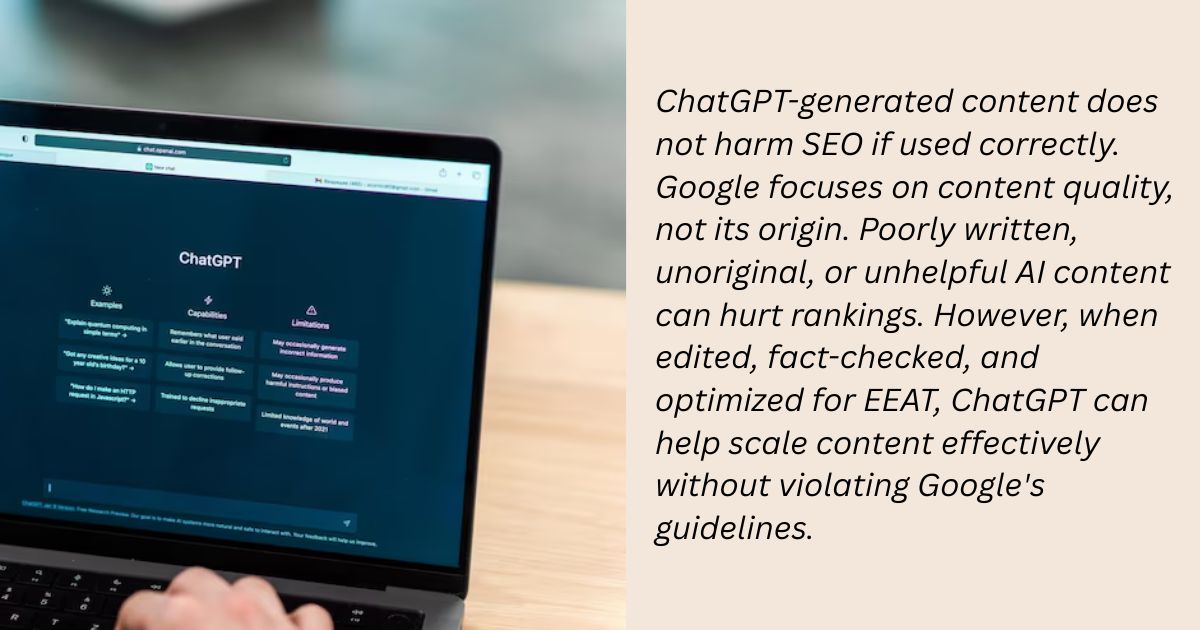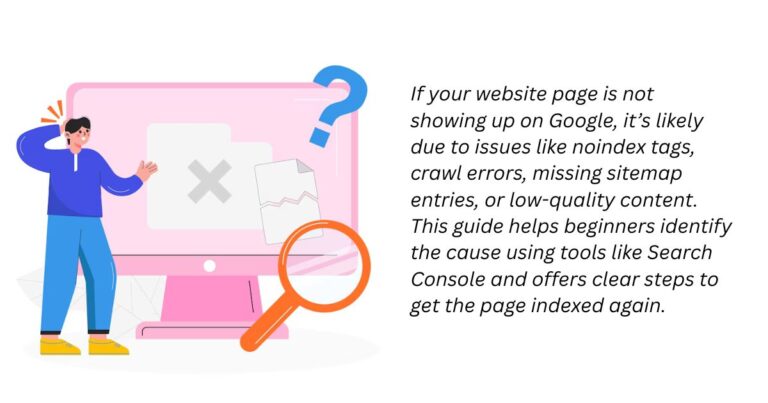No, ChatGPT-generated content does not hurt your SEO by default, but it can negatively affect your rankings if it is low quality, lacks originality, or fails to meet Google’s content quality standards. Google’s algorithms do not penalize content just because it was created by AI, but they do assess whether the content is helpful, original, experience-driven, and valuable to the user. So, if you’re using ChatGPT (or any AI) to produce web content, your SEO success depends entirely on how strategically and responsibly you use it.
This blog will walk you through exactly how ChatGPT impacts SEO—when it can hurt you, how it can help you, real-world examples, and how to use AI-generated content without putting your rankings at risk.
Google’s Official Stand on AI Content: It’s About Quality, Not Origin
Many people assume that Google outright bans AI-written content. That’s not true.
Here’s what Google actually says in its search guidance on AI-generated content:
“Using automation—including AI—to generate content with the primary purpose of manipulating ranking in search results is a violation of our spam policies.”
So the real issue isn’t AI—it’s intent and execution.
Google’s algorithms don’t care whether content was written by a human, AI, or a collaboration of both. What matters is:
- Is the content helpful to users?
- Does it show real expertise or experience?
- Is it original and valuable?
- Does it follow EEAT principles (Experience, Expertise, Authoritativeness, Trustworthiness)?
If your ChatGPT content meets these standards, it can rank just as well as human-written content.
When ChatGPT Hurts SEO: Common Mistakes to Avoid?
Let’s explore in detail the most common scenarios where ChatGPT-generated content leads to poor SEO performance. These are real pitfalls many site owners fall into — especially beginners or those chasing shortcuts.
1. Mass-Produced, Low-Quality Content
One of the biggest temptations is to generate dozens or hundreds of blog posts using ChatGPT in one go and publish them without proper editing or planning.
What happens in this case?
- Thin content: Articles that are 300–500 words with no depth, lacking examples, statistics, or unique perspectives.
- Overuse of generic phrasing: Sentences like “In today’s digital world…” repeated across multiple pages.
- No real value: The content doesn’t say anything that hasn’t already been said on hundreds of other blogs.
Result: Google identifies this as unhelpful content. Pages get low engagement, poor dwell time, and eventually fall in rankings.
Beginner Tip: Just because you can generate content in seconds doesn’t mean you should publish it instantly. Always refine and enhance.
2. Lack of Topical Authority
Let’s say you ask ChatGPT to write a post about “how to start a podcast,” but your website has no other content on podcasting. The result?
- Google sees your site as lacking topical authority.
- The AI content is generic and doesn’t link to any supporting resources or deeper guides.
- There’s no personal experience or case studies.
Why it hurts SEO: Google wants content from sources with proven topical expertise. One-off AI articles feel like they were written just to chase traffic, not to help users.
Solution: Build a content cluster or pillar page strategy. Use ChatGPT to assist in building out related topics, then manually add expertise, internal links, and structure.
3. Zero Personal Experience or Real-World Examples
Google’s “Helpful Content Update” (launched in 2022 and refined in 2023–2024) made it clear:
“People-first content should clearly demonstrate first-hand expertise or a depth of knowledge.”
Most ChatGPT outputs are written based on patterns and public knowledge. They don’t include:
- Personal case studies
- Screenshots or walkthroughs
- Original data or firsthand testing
Why it matters: This makes the content feel shallow and synthetic, reducing trust and engagement.
SEO Impact: Pages with weak EEAT signals (especially “Experience”) may struggle to rank against real expert content.
4. Factual Inaccuracy and Hallucinations
ChatGPT is great, but it’s not always accurate. It can:
- Fabricate statistics
- Quote non-existent sources
- Misstate timelines or facts
Real Example: A blog post on “SEO tools” written by ChatGPT claimed Google Search Console had a paid version — which is false.
SEO Risk: Spreading inaccurate information can damage user trust, increase bounce rates, and even lead to legal or reputational issues.
5. No Optimization or On-Page SEO
ChatGPT is not an SEO tool by default. Unless you prompt it properly, it won’t:
- Use optimized meta titles and descriptions
- Include structured H1-H3 tags
- Add internal links or external references
- Place keywords strategically
SEO Result: Your content may be informative but unoptimized, leading to poor crawlability and underperformance in SERPs.
How ChatGPT Can Boost Your SEO — When Used Right
Now let’s flip the coin. When used strategically, ChatGPT can be an incredibly powerful assistant in your SEO workflow. Here’s how:
1. Speeding Up First Drafts
Instead of writing everything from scratch, you can use ChatGPT to:
- Generate outlines for blog posts
- Create initial content drafts
- Repurpose content into social media snippets
This gives you a solid foundation, saving hours of work.
Best Practice: Use the draft as a starting point, then add expert insights, restructure sections, and refine with SEO tools like SurferSEO or Clearscope.
2. Brainstorming Topic Clusters and Keyword Ideas
You can ask ChatGPT to:
- Suggest long-tail keywords
- Generate related blog post ideas
- Identify FAQs people are asking in your niche
It’s like having an SEO brainstorming buddy on demand.
Caution: Always verify keyword data using tools like Google Keyword Planner, Ahrefs, or Semrush to ensure search volume and competitiveness.
3. Creating Schema Markup, FAQs, and Meta Tags
ChatGPT can help generate structured content elements, including:
- FAQ schema with SEO-optimized answers
- Title tags and meta descriptions with proper character count
- Alt text for images
All of these support better visibility and click-through rates in search.
4. Content Refresh and Expansion
Got old blog posts that aren’t ranking anymore? Use ChatGPT to:
- Expand thin content into full-length guides
- Add new sections or updates
- Rewrite outdated info in a current tone
This approach is great for re-optimizing underperforming pages.
How to Use ChatGPT Without Hurting Your SEO?
ChatGPT is a tool — not a shortcut to rankings. If you treat it as an assistant, not a content farm machine, you can scale content production without sacrificing quality.
Use ChatGPT responsibly by following these guidelines:
- Always edit and fact-check AI output
- Add unique insights, personal experience, or original research
- Follow SEO best practices: optimize titles, headers, meta tags, and internal links
- Align with EEAT and Google’s Helpful Content System
- Avoid publishing large volumes of generic content
Bottom line: AI doesn’t kill SEO — misuse of AI does.
Frequently Asked Questions
Yes, Google can detect patterns common in AI-generated content, but it does not penalize AI content solely based on its origin. It evaluates whether the content is helpful, original, and aligns with search intent.
Not necessarily. Google’s policies focus on quality and intent. AI content used to manipulate rankings or spam search engines violates guidelines. Helpful AI content that serves users is allowed.
You are not required to, but transparency is encouraged—especially in sensitive or YMYL (Your Money or Your Life) niches where trust matters.
ChatGPT can assist with SEO content, but it requires proper prompting, editing, keyword integration, and on-page SEO formatting to be truly optimized for search.
Explore more such blog here – SEO Made Simple | Proven Strategies, SEO Insights and News




